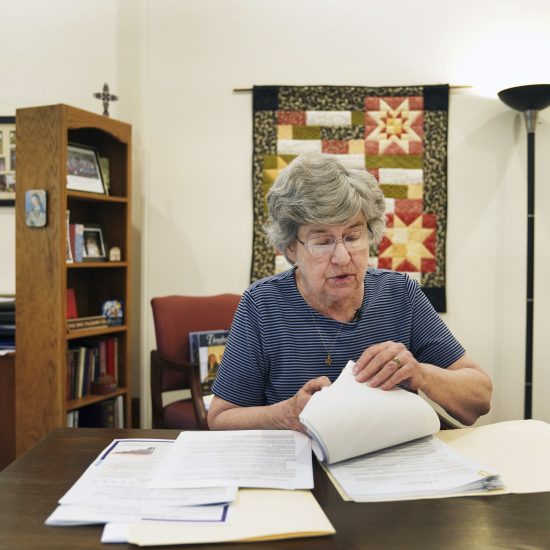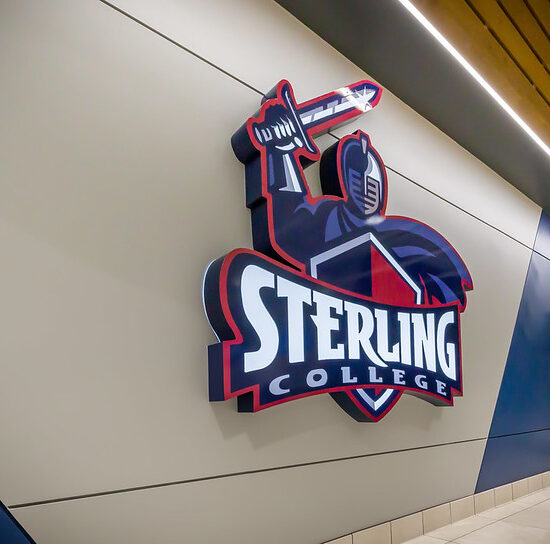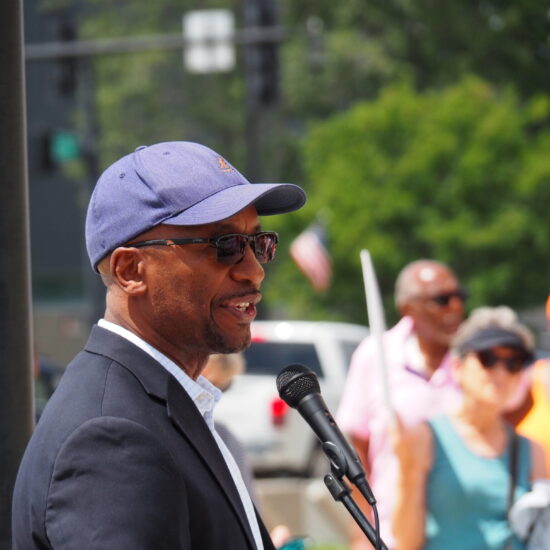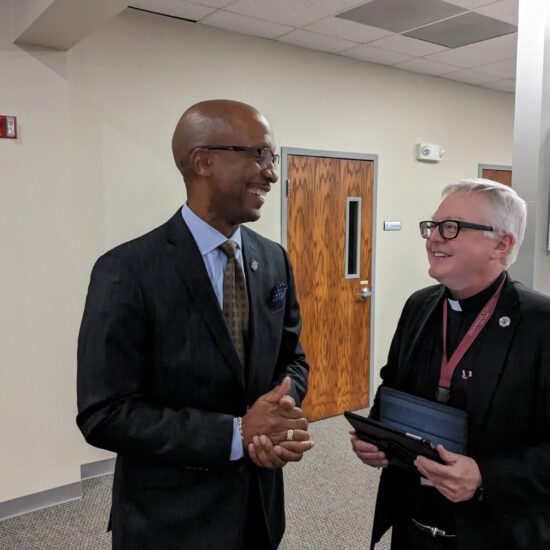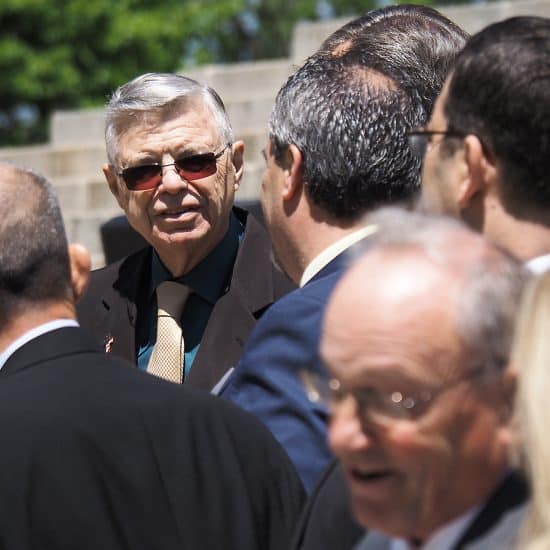AUGUSTA, Kan. (BP) — Each workstation is a flurry of activity. Plastic bottles stream down the conveyer belts. Hands reach out to adjust each bottle to face the same direction before they go to plastic wrap. Across the floor, someone shouts above the rickety-racket to shut down one of the machines and reload.
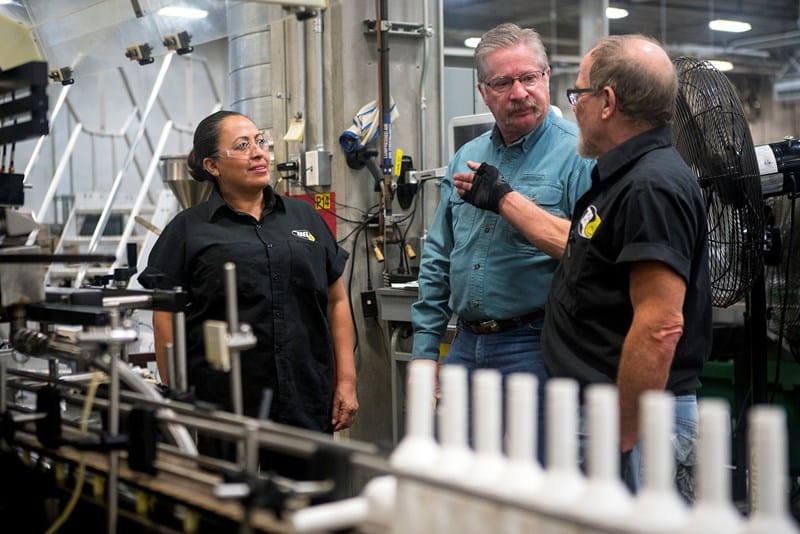 Talking to Elsa Wells and Cory Kroeker (right) and everyone else is Don Mayberry’s goal when the bivocational cowboy church pastor goes to work at one of three BG Products facilities in Kansas — conversations that lead to more serious talks back in the chaplain’s office. (Photo: Sue Sprenkle)Don Mayberry walks through the factory’s maze of machines and activity, stopping to talk to each person. He asks about family, the latest sports event or simply how their day is going. His conversations with coworkers inevitably end in smiles, laughter and lighthearted teasing along with his trademark fist bump or the occasional side-hug.
Talking to Elsa Wells and Cory Kroeker (right) and everyone else is Don Mayberry’s goal when the bivocational cowboy church pastor goes to work at one of three BG Products facilities in Kansas — conversations that lead to more serious talks back in the chaplain’s office. (Photo: Sue Sprenkle)Don Mayberry walks through the factory’s maze of machines and activity, stopping to talk to each person. He asks about family, the latest sports event or simply how their day is going. His conversations with coworkers inevitably end in smiles, laughter and lighthearted teasing along with his trademark fist bump or the occasional side-hug.
It’s the same at the cowboy church Mayberry pastors in Augusta, Kan.
The bivocational pastor spends three 10-hour days a week working as BG Products’ chaplain in three different plants while also pastoring Three Wooden Crosses, or 3WC. His days can get pretty long, especially on Wednesdays when he works all day at BG and then rushes to 3WC’s youth group. It’s not uncommon to go from counseling a vice president of the international auto supply company to sitting atop his horse and sharing the story of Joseph with local ranchers and cowboys — all within a few hours.
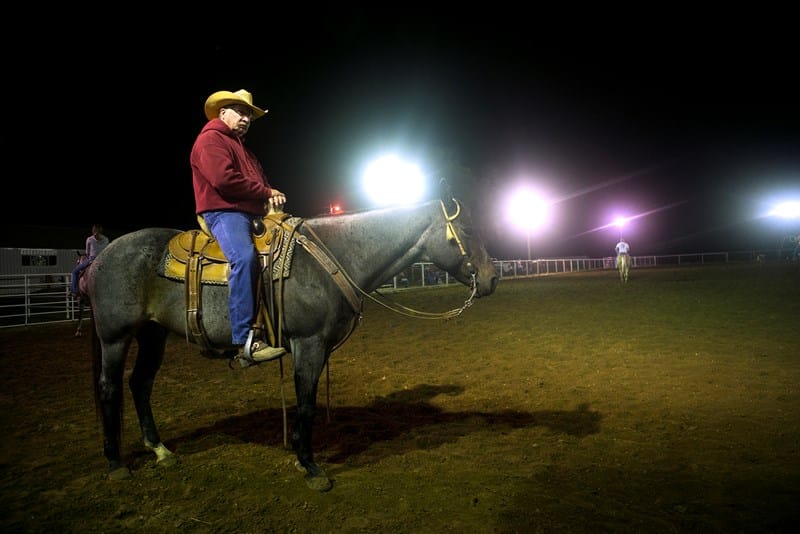 From his perch, bivocational pastor Don Mayberry keeps watch at Three Wooden Crosses cowboy church’s lighted arena in rural Kansas. On the back of his horse is his favorite place to preach. (Photo: Sue Sprenkle)“It sounds like a lot of work but I love it,” Don says. “It’s the Lord. He put these two jobs together that I just love.”
From his perch, bivocational pastor Don Mayberry keeps watch at Three Wooden Crosses cowboy church’s lighted arena in rural Kansas. On the back of his horse is his favorite place to preach. (Photo: Sue Sprenkle)“It sounds like a lot of work but I love it,” Don says. “It’s the Lord. He put these two jobs together that I just love.”
Pastors working two jobs is “not the exception but the norm” in the Kansas-Nebraska Convention of Southern Baptists. David Manner, KNCSB associate executive director, counts 279 bivocational pastors (60 percent of pastorates) throughout the two-state area.
“If we counted support positions, that number would be even higher,” Manner says. “We believe that bivocational ministry could be a game changer in our rural areas. Yet, we rarely have resumes to recommend for the vacant bivocational positions.”
Mayberry and his wife Sherry have only been working in bivocational ministry for four years. The veteran pastor of 35 years spent most of his time working as a fulltime pastor in Illinois and Kansas or as the Illinois Baptist State Association’s director of missions.
Their plan had always been to start a cowboy church when they retired, but God had other plans.
One night, Mayberry recounts, “I dreamed that I had died and gone to heaven. God asked me point-blank why I never did my passion, starting a cowboy church.” The uncertainty of finances was “the only answer I could come up with.”
When he relayed the dream to his wife, they knew they couldn’t wait any longer and that bivocational ministry was the way to meet their needs and follow God’s calling.
Mayberry says the country, for many years, “ignored rural America and walked away from them.” Many small-town grocery stores dried up. Schools consolidated.
“A lot of rural churches either died or are one funeral away,” he says. “We’ve told rural America that they have to go to the city to get what they need and they don’t want to go.
“Bivocational ministry is a way to fill this void and bring Christ to these small communities. Our cowboy church has stepped up as an alternative for the local farmers and ranchers.”
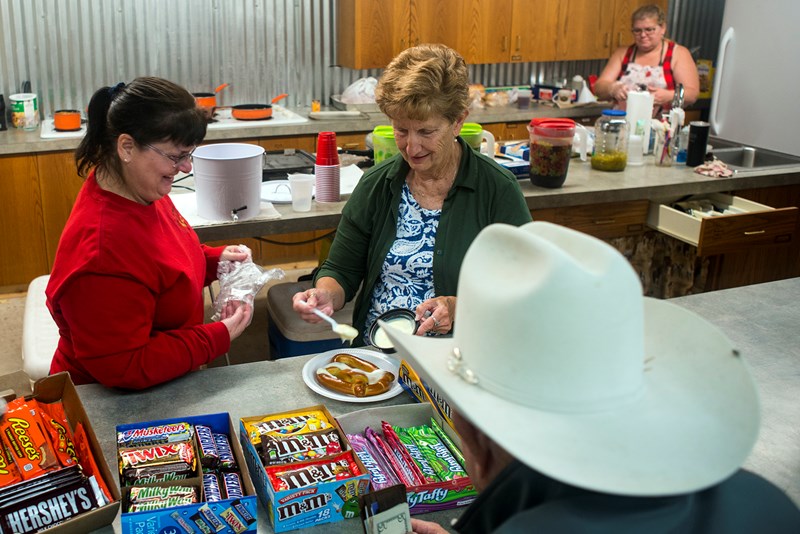 Sherry Mayberry (left) works in the kitchen with other volunteers at Three Wooden Crosses. She and her husband Don, bivocational pastor of the cowboy church, spend many evenings and most weekends in ministry since they also hold second jobs. (Photo: Sue Sprenkle)3WC is a gathering spot for the community, with its big metal building that doubles as a church at the front and an indoor arena for bull riding and goat roping at the back. An outdoor lighted arena, meanwhile, stays busy with events like team roping and mounted shooting. It’s so busy that Sherry, who also holds a fulltime job to help make ends meet, admits she sometimes wishes for a rainout.
Sherry Mayberry (left) works in the kitchen with other volunteers at Three Wooden Crosses. She and her husband Don, bivocational pastor of the cowboy church, spend many evenings and most weekends in ministry since they also hold second jobs. (Photo: Sue Sprenkle)3WC is a gathering spot for the community, with its big metal building that doubles as a church at the front and an indoor arena for bull riding and goat roping at the back. An outdoor lighted arena, meanwhile, stays busy with events like team roping and mounted shooting. It’s so busy that Sherry, who also holds a fulltime job to help make ends meet, admits she sometimes wishes for a rainout.
“We are here every weekend with some event,” Sherry says with a laugh at her own honesty. “But I wouldn’t change it. The church has become part of this rural community and draws in people from other rural areas.
“The nice thing is that we aren’t the only ones here,” she says, motioning to two women working with her in the kitchen. “When you have a bivocational pastor, the congregation really has to step up and be more involved.”
Mayberry readily admits that rural churches like 3WC need bivocational pastors because they can’t afford to pay a fulltime salary. Most of the church members’ equity is tied up in land and livestock. Many also work two jobs to support their families. Giving money to the church is not always easy, but they find ways to tithe.
“Rural people are hard workers,” Mayberry says. “Hard work is also what they respect. You have to realize that it’s in their DNA; it’s how they show their love and support.”
3WC members are easy to spot working around the arena and church — they wear red shirts — effortlessly interacting, for example, with the cowboys and families at the final roping event of the season. They staff the announcer’s booth, gather the steers into the shoot, keep time and even enter the competition as ropers.
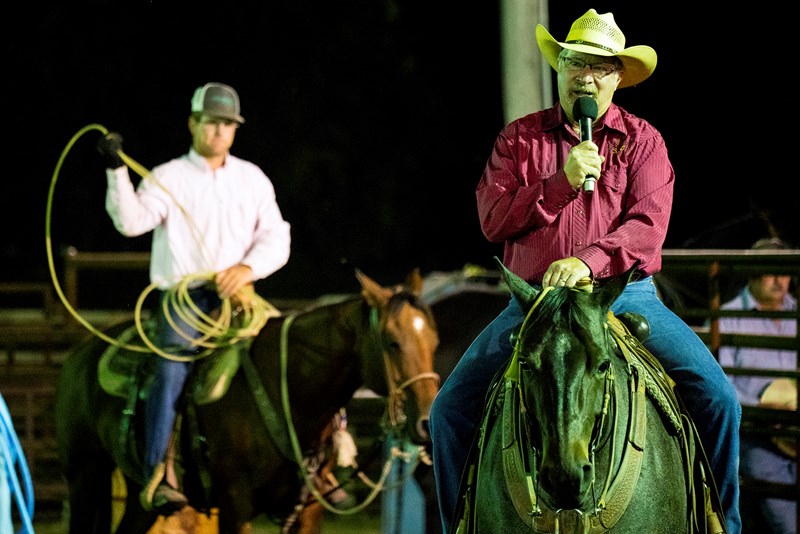 Don Mayberry is pastor of Three Wooden Crosses, a cowboy church in rural Kansas. He works a “day job” with BG Products as chaplain in three facilities. As a bivocational pastor, he doesn’t have a lot of free time but says, “I’ve never felt freer and in the right spot.” Photo by Sue SprenkleSitting in the middle of the activity atop his horse is Mayberry, preaching from his perch and riding from cowboy to cowboy teasing and asking about their families, leaving them with a fist-bump goodbye. He prays with a woman for her son then gives her a side-hug.
Don Mayberry is pastor of Three Wooden Crosses, a cowboy church in rural Kansas. He works a “day job” with BG Products as chaplain in three facilities. As a bivocational pastor, he doesn’t have a lot of free time but says, “I’ve never felt freer and in the right spot.” Photo by Sue SprenkleSitting in the middle of the activity atop his horse is Mayberry, preaching from his perch and riding from cowboy to cowboy teasing and asking about their families, leaving them with a fist-bump goodbye. He prays with a woman for her son then gives her a side-hug.
A visiting roper watches the exchange and asks a red-shirted church member, “Is that man really a preacher?”
They glance at Mayberry loping around the arena. “Yep,” the church member says, adding an invitation to 3WC’s church services. “You’ll feel comfortable. He’s just a regular guy like us. He works two jobs, too.”

